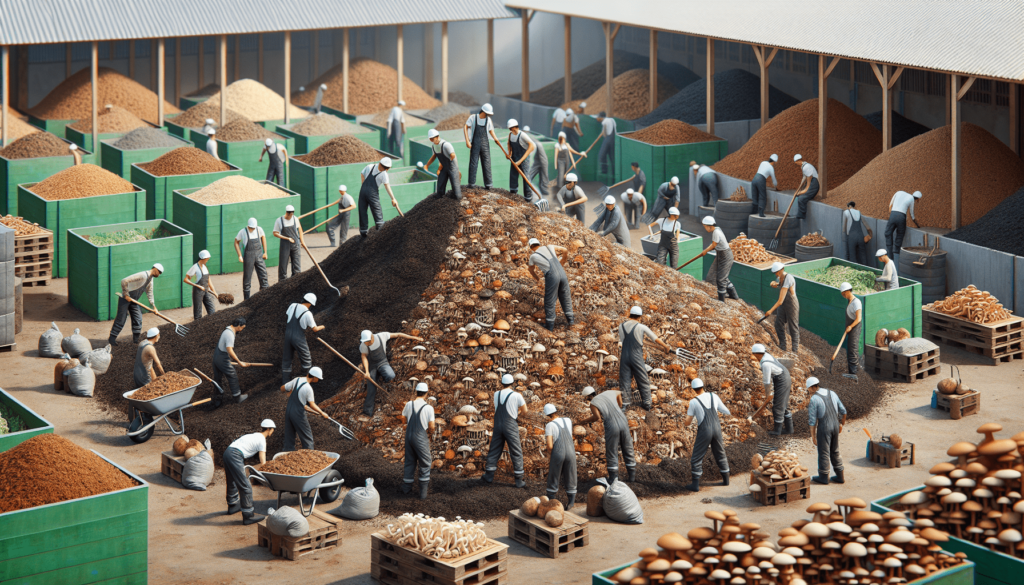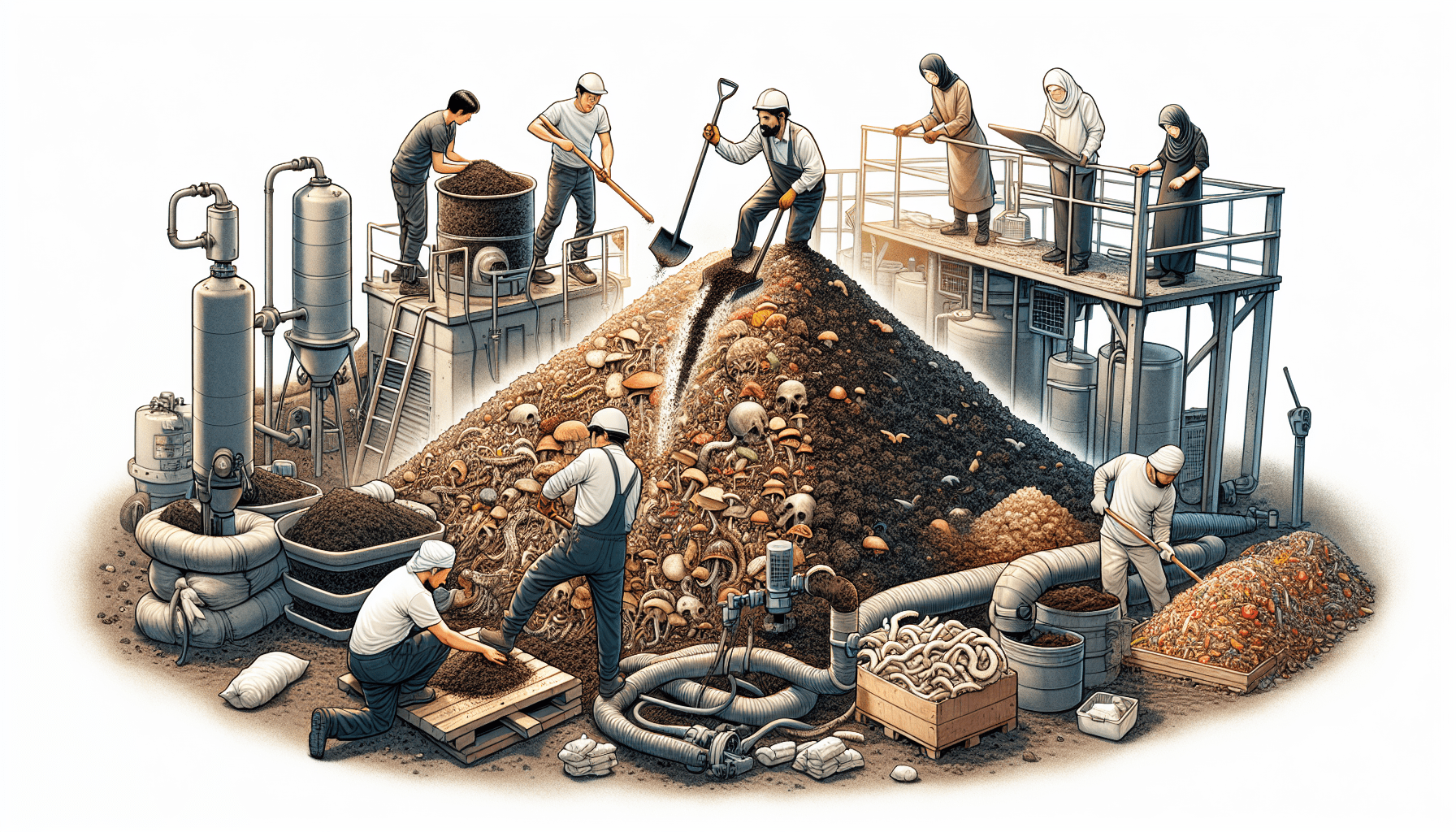Are There Any Challenges Or Common Issues In Mushroom Compost Production?
Have you ever wondered if there are any challenges or common issues in mushroom compost production? Let’s explore some of the obstacles that may arise in the process of producing high-quality mushroom compost.

Common Issues in Mushroom Compost Production
When it comes to mushroom compost production, there are several common issues that growers face. From contamination to inconsistency in compost quality, these challenges can impact the overall success of your mushroom farming operation.
Contamination of Substrates
One of the most common issues in mushroom compost production is the contamination of substrates. Contaminants such as bacteria, mold, and other microorganisms can negatively impact the composting process and result in poor-quality mushroom compost. To prevent contamination, it is essential to maintain strict hygiene practices throughout the production process and ensure that all equipment and materials are properly sanitized.
Temperature Fluctuations
Another common issue faced by mushroom growers is temperature fluctuations during the composting process. Mushrooms thrive in specific temperature ranges, and deviations from these optimal conditions can hinder the growth and development of the fungi. To address this issue, it is crucial to monitor and control the temperature of the compost pile consistently. Using a thermometer and implementing proper insulation techniques can help maintain the ideal temperature for mushroom growth.
Inconsistency in Compost Quality
Inconsistency in compost quality is another challenge that growers may encounter in mushroom compost production. Variations in moisture content, nutrient levels, and microbial activity can lead to differences in the quality of the compost batches. To address this issue, it is essential to carefully monitor and adjust the composting process to ensure that all batches are uniform in quality. Regular testing and analysis of compost samples can help identify any inconsistencies and allow for corrective actions to be taken.
Challenges in Mushroom Compost Production
In addition to common issues, there are also specific challenges that mushroom growers may face in the production of mushroom compost. These challenges can range from sourcing high-quality raw materials to optimizing the composting process for maximum efficiency.
Sourcing Quality Raw Materials
One of the primary challenges in mushroom compost production is sourcing high-quality raw materials. The success of the composting process relies on the quality of the substrates used, such as straw, manure, and other organic materials. Ensuring that these raw materials are free from contaminants and have the right nutrient composition is essential for producing top-quality mushroom compost. Working with reputable suppliers and conducting thorough quality checks can help address this challenge.
Managing Nutrient Levels
Maintaining optimal nutrient levels in the compost pile is another significant challenge for mushroom growers. Mushrooms require specific nutrients, such as nitrogen, phosphorus, and potassium, to support their growth and development. Managing nutrient levels in the compost pile requires careful monitoring of ingredient ratios, as well as the addition of supplements if deficiencies are identified. Regular testing of compost samples can help ensure that the nutrient levels are within the desired range for mushroom cultivation.
Ensuring Proper Moisture Levels
Another challenge in mushroom compost production is ensuring proper moisture levels throughout the composting process. Mushrooms require a humid environment to grow successfully, and maintaining the right moisture content in the compost pile is crucial for fungal development. Monitoring moisture levels regularly and incorporating irrigation or misting systems can help prevent the compost from becoming too dry or wet. Proper aeration and turning of the compost pile can also help regulate moisture levels and promote uniform fungal growth.
Learn about mushroom composting
Best Practices for Overcoming Challenges
While there are challenges and common issues in mushroom compost production, there are also best practices that growers can follow to overcome these obstacles and achieve successful results. Incorporating these strategies into your composting process can help improve the quality of your mushroom compost and optimize your overall production efficiency.
Implementing Strict Hygiene Protocols
To prevent substrate contamination, it is essential to implement strict hygiene protocols throughout the composting process. This includes sanitizing equipment and work areas, using clean raw materials, and avoiding cross-contamination between batches. By maintaining a clean and sterile environment, you can minimize the risk of contaminants affecting the quality of your mushroom compost.
Monitoring Environmental Conditions
Monitoring and controlling environmental conditions, such as temperature and moisture levels, are critical for successful mushroom compost production. Using digital sensors and monitoring tools can help you track these parameters accurately and make adjustments as needed. Regularly monitoring the compost pile’s temperature, humidity, and airflow can help create optimal growing conditions for mushrooms and prevent issues such as overheating or drying out.
Conducting Regular Testing and Analysis
Regular testing and analysis of compost samples are essential for identifying any issues or inconsistencies in the composting process. Testing for nutrient levels, pH balance, and microbial activity can provide valuable insights into the quality of your compost and help you make informed decisions about adjustments. By conducting thorough testing and analysis, you can address any deficiencies or imbalances in the compost pile and ensure that your mushrooms have the nutrients they need to thrive.
Seeking Professional Guidance
If you encounter challenges or issues in mushroom compost production that you are unable to resolve on your own, seeking professional guidance can be beneficial. Consulting with experienced mushroom growers, composting experts, or agricultural extension services can provide valuable advice and assistance in overcoming obstacles. These professionals can offer insights, recommendations, and solutions tailored to your specific situation, helping you improve your composting process and achieve better results.
Conclusion
In conclusion, there are indeed several challenges and common issues that growers may face in mushroom compost production. From substrate contamination to nutrient management, these obstacles can impact the quality and consistency of mushroom compost. However, by implementing best practices, monitoring environmental conditions, and seeking professional guidance when needed, growers can overcome these challenges and achieve successful results in mushroom cultivation. By addressing these challenges proactively and continuously improving your composting process, you can enhance the quality of your mushroom compost and optimize your overall production efficiency.

